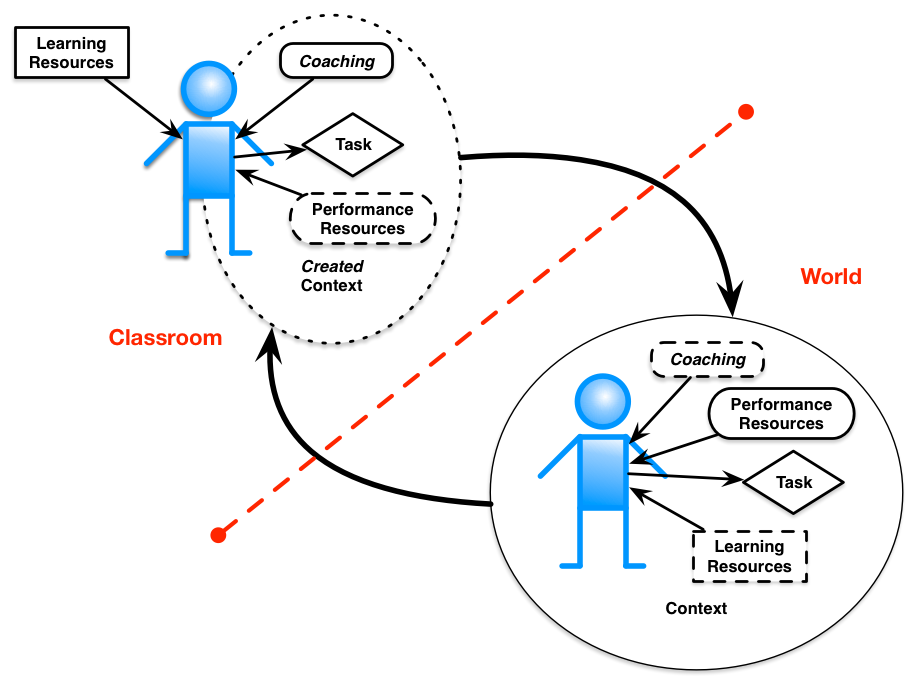In preparation for the upcoming FocusOn Learning Conference, where I’ll be running a workshop about cognitive science for L&D, not just for learning but also for mobile and performance support, I was thinking about how context can be leveraged to provide more optimal learning and performance. Naturally, I had to diagram it, so let me talk through it, and you let me know what you think.
 What we tend to do, as a default, is to take people away from work, provide the learning resources away from the context, then create a context to practice in. There are coaching resources, but not necessarily the performance resources. (And I’m not even mentioning the typical lack of sufficient practice.) And this makes sense when the consequences of making a mistake on the task are irreversible and costly. E.g. medicine, transportation. But that’s not as often as we think. And there’s an alternative.
What we tend to do, as a default, is to take people away from work, provide the learning resources away from the context, then create a context to practice in. There are coaching resources, but not necessarily the performance resources. (And I’m not even mentioning the typical lack of sufficient practice.) And this makes sense when the consequences of making a mistake on the task are irreversible and costly. E.g. medicine, transportation. But that’s not as often as we think. And there’s an alternative.
We can wrap the learning around the context. Our individual is in the world, and performing the task. There can be coaching (particularly at the start, and then gradually removed as the individual moves to acceptable competence). There are also performance resources – job aids, checklists, etc – in the environment. There also can be learning resources, so the individual can continue to self-develop, particularly in the increasingly likely situation that the task has some ambiguity or novelty in it. Of course, that only works if we have a learner capable of self learning (hint hint).
The problems with always taking people away from their jobs are multiple:
- it is costly to interrupt their performance
- it can be costly to create the artificial context
- the learning has a lower likelihood to make it back to the workplace
Our brains don’t learn in an event model, they learn in little bits over time. It’s more natural, more effective, to dribble the learning out at the moment of need, the learnable moment. We have the capability, now, to be more aware of the learner, to deliver support in the moment, and develop learners over time. The way their brains actually learn. And we should be doing this. It’s more effective as well as more efficient. It requires moving out of our comfort zone; we know the classroom, we know training. However, we now also know that the effectiveness of classroom training can be very limited.
We have the ability to start making learning effective as well as efficient. Shouldn’t we do so?
You’re right on the money here Clark. The military has been using this concept for years but they also have the luxury of being able to train and learn this way because: 1. it is their job to train and 2. they train as they fight. every resource is there at the moment it’s needed almost 24/7. I have been taking these methodologies and applying them where I can in my civilian career, but as you have stated, it is difficult more often than not.
Agreed… my concern is that few people have the ability to self-assess well enough to formulate “world-based” resources into tangible gains in performance; the current generation often confuses “info-nuggets” with informal learning/instruction.